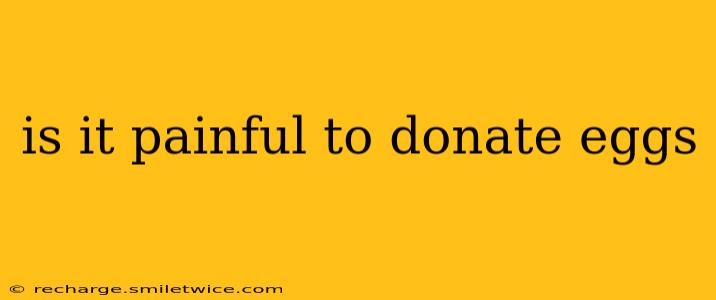Donating eggs is a deeply personal decision, and understanding the potential physical and emotional aspects is crucial. While many women successfully donate eggs without major complications, it's important to acknowledge that the process involves medical procedures and potential side effects. This guide will explore the pain levels associated with egg donation, address common concerns, and provide information to help you make an informed choice.
What are the Different Stages of Egg Donation and Associated Pain Levels?
The egg donation process involves several stages, each with varying levels of discomfort. Let's break them down:
-
Ovarian Stimulation: This is the longest phase, typically lasting 10-14 days. Medications are administered to stimulate the ovaries to produce multiple eggs. Many women report mild to moderate discomfort, similar to menstrual cramps. Some may experience bloating, breast tenderness, and mood swings. Pain is generally manageable with over-the-counter pain relievers.
-
Egg Retrieval: This is a minor surgical procedure performed under sedation or anesthesia. Most women report minimal pain during the procedure itself. However, some cramping or discomfort may be experienced afterward, typically lasting a day or two. Pain management is usually provided by the clinic.
-
Recovery: After the egg retrieval, some women experience mild cramping, bloating, and discomfort for a few days. This is usually manageable with rest and over-the-counter pain medications. Severe pain is uncommon but should be reported to the medical team immediately.
What are the Risks and Side Effects of Egg Donation?
While egg donation is generally considered safe, some potential risks and side effects exist:
-
Ovarian Hyperstimulation Syndrome (OHSS): OHSS is a rare but serious complication that can cause severe abdominal pain, bloating, and fluid retention. Clinics closely monitor patients for signs of OHSS and take measures to prevent or manage it.
-
Infection: As with any medical procedure, there is a small risk of infection at the retrieval site.
-
Emotional Side Effects: The hormonal changes during stimulation can affect mood and emotions. Some women report anxiety or depression.
How Can I Minimize Discomfort During Egg Donation?
Several strategies can help minimize discomfort during the egg donation process:
-
Communication with the Medical Team: Openly discuss any concerns or discomfort you experience with your medical team. They can adjust medication dosages, provide pain relief, and address any issues promptly.
-
Rest and Relaxation: Adequate rest and relaxation are essential throughout the process. Avoid strenuous activities and get plenty of sleep.
-
Healthy Diet and Hydration: Maintaining a healthy diet and staying well-hydrated can help reduce discomfort and promote overall well-being.
-
Pain Management: Over-the-counter pain relievers, such as ibuprofen or acetaminophen, can effectively manage mild to moderate pain. Your medical team can provide stronger pain relief if needed.
Is the Pain from Egg Donation Worse Than Menstrual Cramps?
The experience of pain is subjective and varies from person to person. For some women, the discomfort during ovarian stimulation may be similar to or slightly more intense than menstrual cramps. Others may experience minimal discomfort. The pain associated with egg retrieval is typically short-lived and easily managed with anesthesia or sedation.
What are the Long-Term Effects of Egg Donation?
Most women experience no long-term health effects from egg donation. However, some women may experience irregular periods or changes in menstrual cycles for a short period after the procedure. It's crucial to follow up with your medical team for regular check-ups to ensure your health and well-being.
Is Egg Donation Always Painful?
No, egg donation is not always painful. While some discomfort is expected, the level of pain varies greatly depending on the individual and the specific procedures involved. Most women find the discomfort manageable with medication and support from the medical team. The experience is different for each person.
This information is for general knowledge and does not constitute medical advice. Consult with a healthcare professional for personalized guidance before making any decisions about egg donation.
